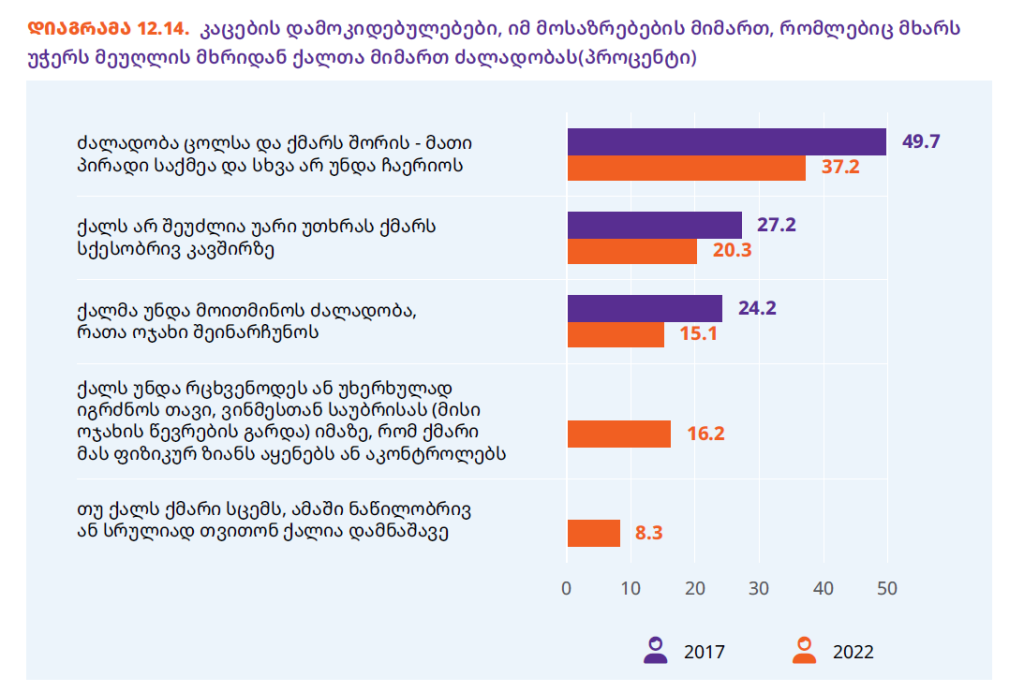74.7% of men in Georgia believe that a woman's main role is to take care of the family. UN survey
UN Women study on Georgia
UN Women and the National Statistical Office of Georgia (Geostat) presented a new survey on perceptions of women, which shows that 59.9% of women and 74.7% of men in the country believe that the most important role of a woman is to take care of the family.
The study surveyed 3,300 women and 1,100 men between the ages of 15 and 69, living both in the capital and in other towns and villages. The qualitative research included 15 interviews, 16 focus groups and 40 in-depth interviews with 171 respondents.
The study asked respondents questions about social norms — for example, whether they agreed with various provisions on women’s and men’s roles in the family and obligations to partners. Some of the provisions referred to traditional, patriarchal, views on the role of women, while others reflected views supporting gender equality.
What women answered
● 59.9 percent of surveyed women believe that the most important role of a woman is to take care of the family. According to the results of a similar survey in 2017, this figure was higher – 65.8 percent.
● 20.2 percent of women believe that a wife should agree with or obey her husband’s opinion, even if she is not sure about the correctness of this opinion or does not agree with it at all. In 2017, the figure was 22.7 percent.
● 55.1 percent of women believe that a man should control and manage the home.
● Women aged 15-24 are less likely to believe that a woman’s primary role is to take care of the family (30.5 percent), that a man should control and manage the home (30.9 percent), and that a wife should agree with or obey her husband’s opinion even if she disagrees with it (6.8 percent).

● Women with higher education are less likely to believe that a woman’s most important role is to take care of the family (47.9 percent), that the man should control and manage the home (39.7 percent), and that the wife should agree with or obey him (9.4 percent).

● About every third woman living in Tbilisi and about every second woman living in other cities believe that a man should control and manage the home.
● Women living in Tbilisi are less likely to believe that a woman’s most important role is to take care of the family (46.2 percent).

● 21.4 percent of women believe that violence between husband and wife is their own business and no one else should interfere.
● 10.6 percent of women believe that a woman should be ashamed or embarrassed to talk to anyone (other than her family members) about her husband physically harming or controlling her.
● 9.8 percent believe that a woman should tolerate violence to keep her family together.
● 8.5 percent of women believe that if a woman is beaten by her husband, it is partly or entirely her own fault.
What did men answer?
● Three-quarters of the men surveyed (74.7 percent) believe that a woman’s most important role is to take care of the family.
● More than one-third of men (37.3 percent) believe that a wife should agree with and obey her husband’s opinion, even if she is not sure of the correctness of that opinion or does not agree with it at all.
● According to 77.6 percent of men, a man should control and manage the home.
Men’s attitudes toward gender roles differ significantly across age groups:
● Men aged 15-24 and 24-34 are less likely to believe that a woman’s most important role is to take care of the family (64.3 percent and 63.2 percent respectively).
● Men aged 15-24 are also less likely to believe that a man should control and manage the home (61.6 percent) and that a wife should agree or obey her husband’s opinion even if she disagrees with it (20.4 percent).
UN Women study on Georgia

●Rural men are more likely to believe that a woman’s most important role is to take care of the family (83.2 percent), that a man should control and manage the home (87.6 percent), and that the wife should agree with him (47.8 percent). These figures are lower in Tbilisi than in other cities and villages.

● More than a third of the men surveyed (37.2 percent) believe that violence between husband and wife is their private matter and no one else should intervene (the figure has decreased; in 2017 it was 49.7 percent).
● 20.3 percent of men believe that a woman cannot deny her husband sexual intercourse.
● 16.2 percent of men believe that a woman should be ashamed or embarrassed to talk to anyone (other than family members) about her husband physically harming or controlling her.
● 15.1 percent of respondents believe that a woman should tolerate violence in order to keep the family together.

The study noted that when talking about gender and gender roles in focus groups, men often used conservative ideas and language related to religion
UN Women study on Georgia


















